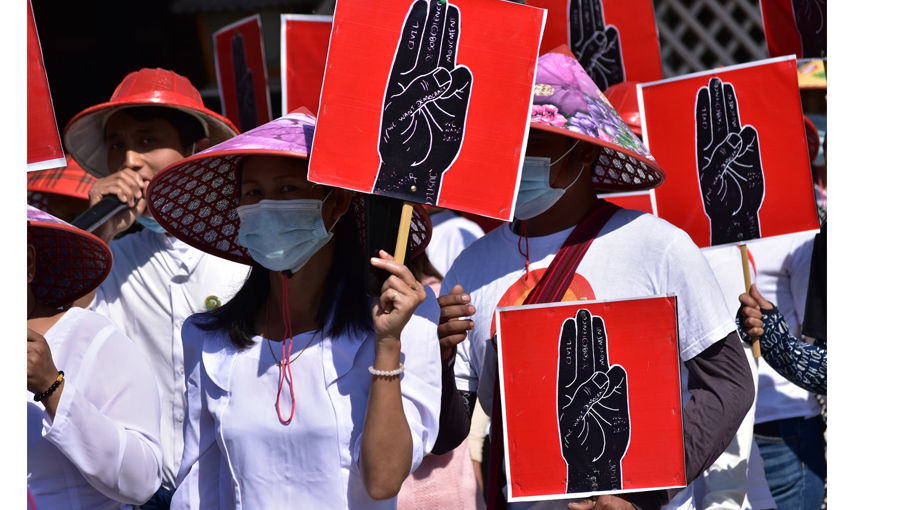Is Myanmar trying to distract the international community?

Since more than 1 million Rohingya migrants entered Bangladesh from Myanmar's Rakhine province after escaping severe torture, relations between the governments of Bangladesh and Myanmar have worsened. Despite international pressure, the Myanmar government has no intention of accepting these Rohingya refugees. Conversely, international organizations have attempted to persuade the Rohingyas and the Myanmar government to return to Rakhine. But the Rohingya have turned down these offers over and over because they are afraid of being tortured again by the Myanmar military.
Prime Minister Sheikh Hasina of Bangladesh has shown her generosity by allowing over a million Rohingya refugees to stay in the country. The international community also praised her decision to open the border and allow Rohingya victims of cruelty in Rakhine province to enter Bangladesh, even though these refugees could pose a threat to the economy and national security. The decision was made without political considerations and only based on humanitarian concerns. Despite widespread criticism from the opposition, the government of Bangladesh ultimately went ahead with this plan.
Yet, despite time, no viable solution has been found for this issue. Despite the support of many human rights organizations worldwide, powerful countries have not come out to support Bangladesh. Repeated attempts by Bangladesh to bring this matter to the attention of the international community have resulted in nothing except the continued disdain of some of our more powerful neighbors. The Rohingya population continues to grow, and as a result, more and more Rohingya are settling in different regions of the country, which could pose a security risk. Even though the Bangladeshi government is putting a lot of pressure on the rest of the world, none of the countries that could help make international decisions has taken a strong position on the Rohingya issue, despite all the talk about human rights.
Fear has spread among the people due to a month-long event involving the firing of mortar shells from Myanmar into the border of Bangladesh. On August 28, two mortar shells fired from Myanmar landed in the vicinity of the Naikshyongchari area in the city's north. By failing to detonate, the mortar shells prevented potentially disastrous incidents for the local population. One person was killed, and six others were injured on September 16 when a mortar cell from Myanmar attacked a camp in No Man's Land in Tambru, near the boundary of Ghumdhum Union in Naikshyongchari, Bandarban, Bangladesh. Bangladesh's foreign ministry summoned Myanmar's envoy on August 28 after the country was hit by mortar fire for the first time and sought an explanation. The ambassador did not offer an apology, instead calling it an "unintentional" event. Tensions rose after five days when Myanmar launched a second attack on the Bangladesh border. However, in the previous two weeks, the Myanmar ambassador to Bangladesh has been called three times to discuss Bangladesh's serious concerns over airstrikes, airspace violations, and mortar fire within Bangladesh.
But as this occurrence has persisted on the part of Myanmar, many have begun to wonder if Myanmar intends to start a war with Bangladesh. Bangladesh's government has made it clear that it has no interest in starting a conflict with any of its neighbors. The Home Minister added that any attempt to undermine the country's autonomy and sovereignty would be challenged seriously.
Following international law, the Myanmar Army is not permitted to conduct operations within eight kilometres of the border with Bangladesh. Any firing along the border with Bangladesh is likewise illegal. Recent attacks by Myanmar have been an affront to Bangladeshi sovereignty, straining already tense relations between the two countries. And yet, the mystery remains: why is this occurring? There are two possible explanations for Myanmar's aggressive stance toward Bangladesh. At the outset, they wish to postpone the permanent repatriation of Rohingya from Bangladesh to Myanmar in light of the current crisis on the border between the two countries and the ongoing civil conflict in Myanmar. Furthermore, the likelihood of Rohingya infiltration into Bangladesh would be revived if the civil war there resumed. Second, the junta government of Myanmar indirectly invites Bangladesh to war to draw attention away from the atrocities committed by the junta in Myanmar, the continued efforts by the international and regional community to solve the Rohingya crisis, and the increasing economic pressure being put on the junta government.
However, despite these two alternatives, there remains the potential for a third. Bangladesh's foreign policy rests on making and keeping friends around the world. This policy guides the efforts of the government of Bangladesh to keep amicable relations with all of our regional neighbors. Significant historical ties have been between Bangladesh and India due to India's role in Bangladesh's independence war. Conversely, business ties between Bangladesh and China have grown considerably during the past decade.
Sheikh Hasina, the prime minister of Bangladesh, travelled to India in the first week of September. Questions have been raised concerning the potential connection between this visit and the landing of Myanmarese mortar shells in Bangladeshi territory both before and after the visit. Since relations between Bangladesh and India have traditionally been excellent, the prime minister of Bangladesh may have asked her Indian counterpart for support on the Myanmar issue, among other bilateral issues.
However, the world community stands behind Bangladesh even though the Myanmar government has not yet acknowledged the week-long attack. On September 10, the ambassador of Japan and the high commissioners of Malaysia, Canada, and the United Kingdom voiced their worry over Myanmar's disregard for international law, saying that this might have a chilling effect on security in the area and the Indo-Pacific. This matter, therefore, cannot be considered an isolated event. Through international channels, Bangladesh's government should pressure Myanmar to comply with international law. Though there are many angles to consider, I believe the Myanmar government may have orchestrated this tragedy to deflect international attention away from the Rohingya crisis. Therefore, the government must pay due attention to this issue and decide.



